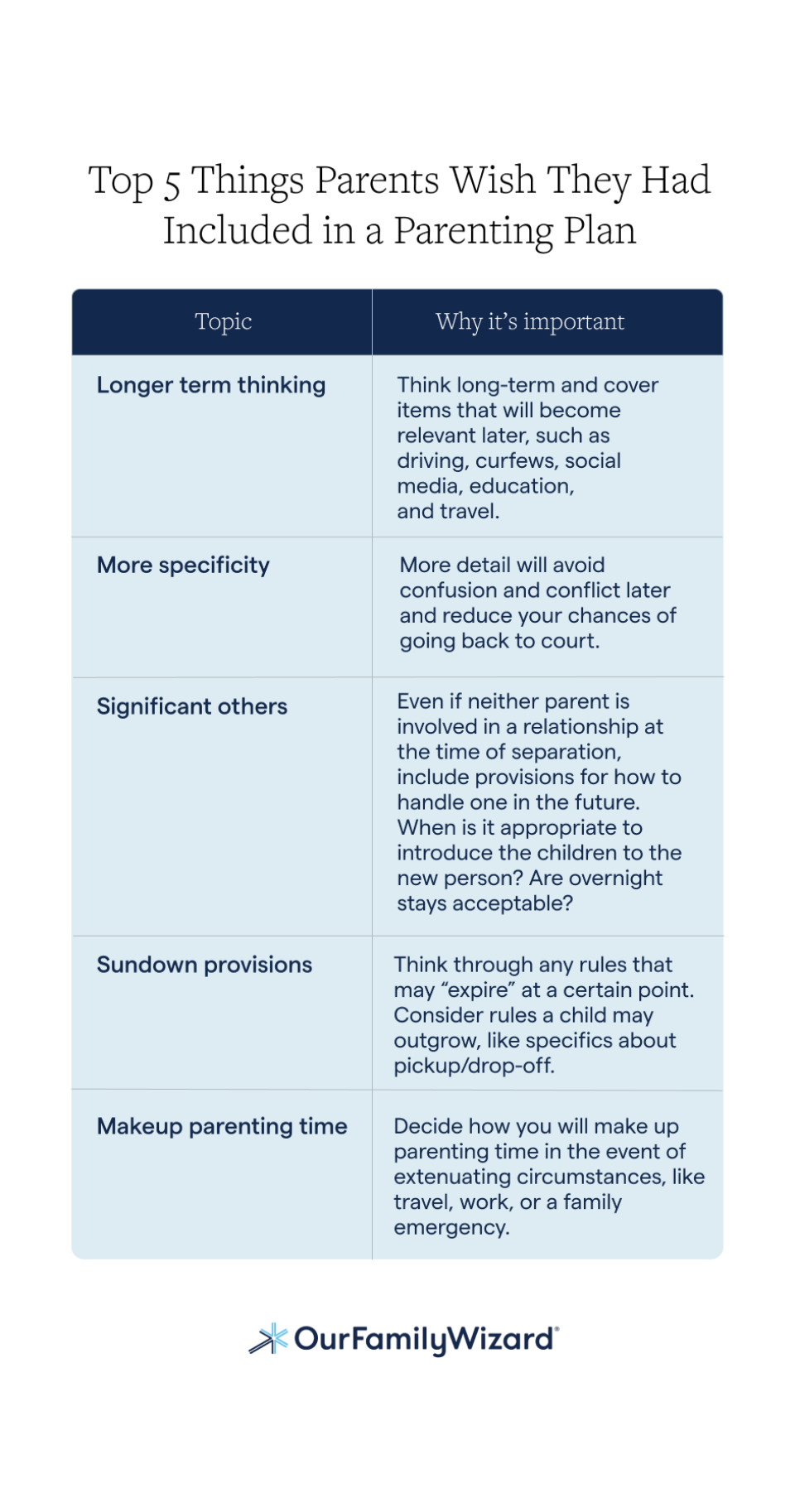Everything You Need to Know About Parenting Plan Elements: Free Checklist Included
When couples with children separate or divorce, they must create a parenting plan. In this guide, experts explain how to make a comprehensive plan that eases the transition, lowers tensions, and avoids future litigation. Also, explore commonly missed items and download our checklist.
Key Takeaways
- Make your parenting plan highly specific so it’s clear to follow and minimizes the chance of returning to court.
- Cover topics affecting the child in the coming years, such as driving, social media, curfews, and post-secondary education.
- Include commonly missed sections like rules around significant others and compensating for lost parenting time.
- Consider special situations like high-conflict relationships or having a special-needs child.
Topics to include in your parenting plan
A parenting plan should address daily activities, long-term plans, and how parents will make future childcare decisions. A strong plan contains specifics, reflects long-term thinking, and prioritizes the child’s best interest.
Below is a list of the topics and items you should include in your parenting plan, grouped by category. Custody experts offer tips and guidelines to make your parenting plan as comprehensive as possible.
Day-to-day activities
- Custody plan: Parents typically work with their attorneys to spell out custody arrangement specifics in the parenting plan. For example, how will co-parents with joint physical custody split their time with the child? What parenting schedule will they use? Is the split 50-50, 60-40, or another schedule? How will it fit with work and school schedules while serving the child’s best interests?
These details must align with any court order determining the type of custody, such as joint or sole physical custody and joint or sole legal custody. Physical custody determines where the child will live, and legal custody determines who makes major decisions about the child’s upbringing. One parent may be the custodial parent, taking care of most or all childcare responsibilities. Custody laws and terminology vary among jurisdictions, but the same general concepts apply. - Visitation plan: Similarly, parents define a visitation schedule specifying when a parent can visit the child during another parent’s custody time. It’s important to define a visitation schedule, whether you have shared parenting or if one parent has full custody.
- Drop-off and pickup: Specify how the custody exchanges will occur. Will one co-parent drive the child or children to the other co-parent’s house? Will both parents meet at a neutral exchange location like a restaurant or park? Be specific to avoid confusion or frustration later. Additionally, define any consequences for a late drop-off or late pickup.
- Transportation: Describe how co-parents will handle transportation to school, extracurriculars, and other events. Consider situations where one parent might technically have custody of the child but can’t transport them. What happens then? Consider all potential scenarios, like having a family friend or relative drive, public transportation, or the child driving themselves, if applicable.
- Backup childcare: Will you have backup childcare outside the custody plan? The parenting plan should outline options like daycare, a nanny, a relative, or a friend. It should also address how the co-parents will make future decisions if circumstances change. Finally, it should include how the parents will manage childcare costs.
- Third-party relationships: Describe who can spend time with, transport, and communicate with the child. Think about extended family and friends. For example, grandparents may provide childcare, or friends may pick up the child after school. Also, what about family or friends who may visit more occasionally?
- Extracurricular activities: Define how co-parents will manage the children’s extracurricular activities, including the time and cost involved.

“There is a wide variety of what ‘extracurricular activities’ can actually include,” says Brad Benedetto, Michigan family law attorney and legal liaison for OurFamilyWizard.
He gives the examples of a AAA travel hockey team, which might require dozens of out-of-state games, versus a local hockey league, which would be considerably cheaper and less time-intensive. “Having these conversations during the divorce or separation can prevent future litigation,” Benedetto says.
Conversely, consider whether either parent has strong feelings about certain sports or activities.
Danielle Kestnbaum, lawyer, MSW, and professional liaison for OurFamilyWizard, also recommends asking if any activities are off-limits. For example, she says, “How do both parents feel about tackle football?”
if any activities are off-limits. For example, she says, “How do both parents feel about tackle football?” - Children’s belongings: The parenting plan should clearly state if both parents agree to have a set of the child’s belongings at each house, including clothes, toys, homework supplies, and activity gear. They should also define belongings that will move back and forth between households and how that will occur. What happens if something is forgotten? Answering these detailed questions ahead of time will help you avoid emergencies or conflicts later.
The ideal is to have everything the child needs at both houses. “Having certain items at each house is meant to reduce the burden on the child of feeling like they are constantly packing and having to plan for what they will need and where,” Kestnbaum says. - Parent dual attendance: Inevitably, both parents will want to attend certain events, such as extracurricular games, parent-teacher conferences, and birthday parties. It’s a good idea to describe expected behavior in the parenting plan, so both parties act appropriately and don’t have to avoid an event they want to attend.
Communication
- Virtual visitation: Outline how co-parents will manage child-parent communication during the other parent’s custody time. Who can initiate contact? How will you return calls if the child or parent is unreachable? What forms can it take, such as video calls, phone calls, emails, and texts? How frequent can they be?
“This has become increasingly common since the COVID-19 pandemic,” says Benedetto. “Today, both parents and children are comfortable and literate with technology like FaceTime and OurFamilyWizard’s Calls feature, and it can help to have check-ins.”
Benedetto adds that defining texting parameters in the parenting plan is much less common, but it can be helpful to discuss screen time in general. - Children’s media and technology permissions: State the age at which the child can get social media accounts. Which platforms can they use, and how much time can they spend on each?
If the children are too young to help decide, experts recommend at least including a section on how parents will reach an agreement about social media permissions later. Additionally, research shows the importance of creating developmentally appropriate parenting plans, which parents map out based on their child’s age, including what will happen as the child grows up.
Child-rearing values
- Religion: Include a section stipulating how co-parents will handle religion in the child’s life. Will they attend church services and participate in faith-based events and ceremonies? This is especially important if the parents represent two religions or only one parent wishes to raise the child religiously.
- Schooling: Agree on expectations for schooling. Will co-parents pursue public or private school from kindergarten to high school? How will they manage expenses between the parents? Which parents' address will they use for school zoning? Ensure both parents are on the same page about how they intend to educate the child.
- Post-secondary education: Describe the plan or expectation for post-secondary education. How much are parents willing to contribute financially? Our experts note that not all parenting plans include a section on college or post-secondary education, as it may be impossible to forecast. However, it’s worth discussing if one parent has a strong feeling about how this should be handled, financially or otherwise.
- Discipline: Include guidelines on how you plan to discipline the child. For example, will co-parents raise and discipline the child according to a certain parenting philosophy or style?

Holiday and vacation time
- Holiday custody schedule: Include a detailed holiday custody schedule. One common approach is to alternate holidays yearly (e.g., Thanksgiving with Mom one year, Thanksgiving with Dad the next year). Get specific. Decide when each holiday will begin (e.g., the morning of or the evening before) and how you will handle extenuating circumstances, such as a year where one parent plans to travel for a holiday.
- School breaks: Similarly, decide how you will manage custody time during school breaks, including winter, spring, and summer breaks, three-day weekends, early release days, and other schedule anomalies.
- Special dates: Our experts also recommend including a section on special dates or events that both parents might want to attend, such as a birthday party, sports event, or wedding. Benedetto gives this example: “Can both parents attend the event, even when it falls on the other parent’s time?” Also, consider special events, such as a family reunion or wedding, that may fall on another parent’s time. How will you handle these situations?
- Out-of-area or international travel: Include provisions for out-of-area or international travel, including the child. Does one parent have to seek the other parent’s permission to fly with the child? How far in advance should the other parent be notified? Which parent will handle travel necessities, such as passports and vaccines?
Healthcare
- Providers: Include details about which medical professionals you will send your child to, including a pediatrician, dentist, and other specialists. This ensures the child can develop a trusting relationship with their providers. You should also include provisions for how parents will agree upon providers in the future.
- Expenses: Which parent will manage medical expenses? These could be out-of-pocket expenses that insurance doesn’t cover and any additional transportation, medication, or treatment needs.
- Health insurance: Decide if one parent will assume health insurance for the child. It’s also worth deciding how to manage insurance decisions later if the parents’ employment status changes.
- Routine appointments and check-ups: Outline how co-parents will manage regular appointments and check-ups, including scheduling, transportation, and accompanying the child to the doctor’s office. What if both parents want to attend appointments?
Safety
- Safety measures: List any standard safety measures both parents should adhere to. Consider activities like bike riding or skiing that may warrant safety measures, like wearing a helmet.
- Internet safety: What limits should parents place on their child’s internet use? Discuss what websites they have access to and at what age, as well as any banned websites or usage.
- Guns or weapons in the home: How will co-parents ensure the child’s safety if there are guns or other weapons in the home? If one parent feels strongly about not having guns or other weapons in the house, note that in the parenting plan.
- Curfew: Will both parents impose the same curfew on the children, or can each parent make their own rules? How will curfews be enforced? Even if the children are too young for a curfew to make sense now, plan how both parents will reach an agreement later.
- Child solo transportation: Note when, where, and how the child is allowed to travel alone. Examples include school, a friend’s house, and swimming lessons. Can they walk there, take public transportation, or drive? Are certain modes of transportation off-limits?
Parental behaviors
- Overnight guests: Decide whether the parent’s overnight guests (such as a date) are allowed when the child is present. Even if this isn’t on the table when creating a parenting plan, it’s worth considering to save stress and arguments later.
- Significant others: How will co-parents manage a new significant other? How long should they wait to introduce the new person to the child? Make this crystal clear to avoid arguments later.
Additional considerations
- Who will claim a tax deduction?
- What happens if a parent must relocate?
- Which language will you speak and teach at home (if the family is multilingual)?
- What happens if a parent doesn’t follow a part of the parenting plan?
- How often will you revisit and revise the parenting plan?
Benedetto encourages co-parents to be proactive with their parenting plans. “Parents can ask their lawyer to include certain items,” he says. “They don’t need to wait for the lawyer to bring it up.”
Creating a parenting plan that includes all of this information can be daunting. For background, read our guide to creating a parenting plan in six steps. Also, learn what you should consider before modifying your parenting plan, should that ever occur.
Free parenting plan checklist
Download our free parenting plan checklist to ensure you’ve included all necessary items in your plan. This checklist contains all the items listed in the above section, as well as prompts for each item to help you define them.
Download in Microsoft Word or Google Docs, or download as a PDF
Most common items parents wish they included but didn’t
Parents often wish their parenting plans were more specific and long-term. For example, people often forget to include sections on significant others and sundown provisions. They also wish they had included more details on costs, transportation, and communication.
- Longer-term thinking: Resist the urge to define only the factors relevant to your current situation. Think longer-term, especially about items that will become important as your child ages.

Tracy Krall, a professional liaison for OurFamilyWizard and a former family law attorney in Arizona, gives a few examples. “Consider future things like curfews, whether tattoos and piercings allowable, and at what age the child can be on social media, which platforms, and what age a child can get a cellphone,” she says.
Long-term planning is essential. To avoid going back to court later on, think through how your child’s life will change over time. For example, an 8:00 p.m. bedtime works for a young child, but what about when they are 16?
- More specificity: Krall says the most common mistake she sees is vagueness. “Parents might be getting along at the moment they are crafting the parenting plan, so they leave it loose, but things might change, the temperature of the relationship might change,” she says. She recommends getting specific. Include things like pick-up and drop-off times and holiday custody timing. The less you leave to the imagination, the less you have to potentially come back to court about.
Additionally, the stronger and more specific the parent plan, the smoother the transition will be for the child. Given the ample evidence that stronger parenting plans lead to better child-parent relationships, it’s worth taking the extra time to get detailed in your plan.
- Significant others: Kestnbaum recommends that during the divorce or separation proceedings, you anticipate both partners having new significant others down the line. “How are you going to handle introducing them to the kids?” she asks. When defining these parameters, consider what is age-appropriate for the kids and how the stipulations may change as they grow up.
- Sundown provision: “You might also consider creating a sundown provision,” says Krall, stating that a rule can change or dissolve after a certain date. For example, “Maybe for a holiday like Halloween, you decide to no longer consider it a holiday once the child turns 12.”
- Makeup parenting time: Include details about how you will make up parenting time in the event of a business trip, vacation, or other extenuating circumstance. On the flip side, how will you manage compensatory custody time when one parent is late or otherwise invades the other parent’s custody time? Get specific about what these consequences will look like for all parties.
Additional parenting plan items to include for special situations
Special situations may prompt additional items in a parenting plan. Examples include long-distance parenting, a special-needs child, or a high-conflict situation. It’s best to address these situations upfront rather than create confusion later.
- A high-conflict situation: In high-conflict separations or divorces, it’s essential to be as specific as possible. “If it’s spelled out in the parenting agreement, there’s nothing to argue about,” Krall says. “On the other hand, any gray area can be taken advantage of by either party, which inevitably negatively affects the child. Remove the possibility of back-and-forth communication between the parents to avoid additional conflict down the line.”
In this scenario, you should also include the following elements:
- How you will handle sharing information about the child with others, such as sharing medical information with a new partner.
- Detailed directions for handling unexpected schedule changes. Without this information, you may find yourself in explosive custody schedule conversations later.
- Specifics on each parent’s preference for communication channels (text, email, call) during the other parent’s custody time.
- Restrictions and consequences for hostile, harassing, or toxic communication.
- Terms for a cooling-off period after a fight, either in person or over any communication channel.
Detail will be your friend. If they’re not a person you can work with logically, the more detail, the better.
- A child with special needs: Whether the child has a mental or physical disability, they will likely need additional medical and parental support. This means that when creating a parenting plan, you need to include additional stipulations about how you will handle their care.
“Parents need to be on the same page about medical and education decisions in terms of what the child is going to require,” says Krall. “Think about nutrition, medication, medical treatments, and medical equipment.”
Kestnbaum recommends identifying a point person to advocate for the parents and child and evaluate different care options. “Include a clause to agree upon providers and fulfill the recommendations of the chosen provider,” she says. “You can then designate this point person to make decisions and only take different action if both parents disagree about the proposed treatment plan.”
Following that, both parents should participate in — or explain how they will independently manage — the child’s individualized education plan (IEP), appointments, and meetings. The plan should also cover how they will manage insurance and out-of-pocket medical costs.
Krall notes that both parents’ homes may need to be equipped, too. “Make certain that both parents have a similar setup at their respective homes if the child is handicapped. You don’t want to be taking a wheelchair back and forth, for example. We need to make the child comfortable in both places, and the actual parenting time should fit the child’s medical needs.”
“You don’t want the parents to get burned out either,” says Krall. “Work in some downtime so they can rejuvenate, ensuring that neither parent is burned out by being the primary caretaker.”
- Long-distance co-parenting: For long-distance co-parenting plans, consider school schedules and how they might differ between states. Also, think about who else can watch the child or drive them to school. They may include new spouses, friends, or relatives. Have the conversations about out-of-state or international travel and how much notice the other parent will need. Do they need ten days? Thirty days?
Kestnbaum advises her clients to address travel costs so that parents know who will purchase the plane tickets and pay other expenses.
- Co-parenting with step-parents: The parenting plan should detail how step-parents will be involved. Can they discipline, transport, or travel alone with the child? Additionally, will they be involved in medical or other personal decision-making and care? Define this upfront to avoid further later.
- Birdnesting: Some families opt for “birdnesting,” where the child stays in the family home and the parents take turns staying with the child. This can reduce the burden on the child to switch back and forth between households, but it also presents other challenges. In birdnesting parenting plans, add specifications for how the parents will exchange places, who will secure other places to stay, and how custody will work.
- Parallel parenting: This refers to situations in which the parents agree to raise the child with as little interaction with each other as possible. Parallel parenting works well for high-conflict situations but requires additional planning. In parallel parenting plans, include how you will manage child exchanges, decisions, adjustments, and other logistics with minimal interaction.
The easiest way to start exploring & managing your parenting plan options
It can be overwhelming to create a custom parenting plan that adequately addresses all the factors and considerations listed above. OurFamilyWizard, the leading co-parenting app, makes it easier to develop one - and follow it.
With OurFamilyWizard, you can map out a custody schedule using different splits (like 50/50, 60/40, or 70/30) and different patterns (like 2-2-3 or every weekend), reflecting the schedule in your parenting plan. You can also follow many other parts of your plan, such as communicating on the record and splitting costs. Plus, it lets you grant access to professionals like your attorney so you can keep them in the loop of your co-parenting communication as needed.


